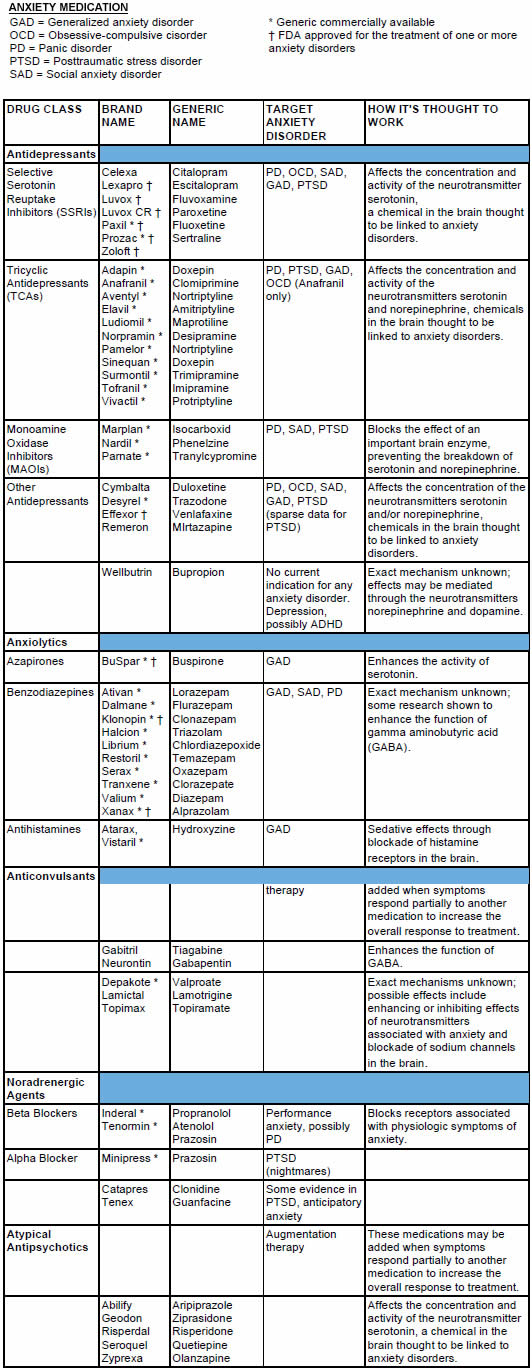Discover all medications to get rid of anxiety and anxiety disorders. Medication treatments. List of anxiety medications. Anxiety treatments.
Anxiety: Medication for anxiety
Approximately 75% of patients respond to the initial low dose of antianxiety medication. The main drugs prescribed by the doctor against the anxiety are:
Antianxiety medications:
Antianxiety medications, also commonly called minor
tranquilizers, are used for treating anxiety disorders. Before the introduction of
benzodiazepines, the
barbiturates were widely used for treating anxiety and sleep disorders. Phenobarbital and other similar long-acting barbiturates were commonly used to treat anxiety and to assist in bedtime sleep. With the release of Valium (diazepam) and Librium (chlordiazepoxide) in the 1960s, the benzodiazepines replaced the barbiturates for treatment of anxiety and sleep disorders. Benzodiazepines are prescribed more often than barbiturates because they have a higher margin of safety in overdose; in fact, benzodiazepines are the most frequently prescribed of all antianxiety and hypnotic agents. However, benzodiazepines are associated with abuse, dependence, and withdrawal symptoms and thus are regulated understate and federal laws as controlled substances.
BuSpar (buspirone), a non benzodiazepine, is another agent used for treatment of anxiety. Unlike the benzodiazepines, buspirone is not associated with dependence and withdrawal symptoms and is not regulated as a controlled substance.
Antidepressants also are effective for treating various anxiety disorders, such as panic disorder, generalized anxiety disorder, posttraumatic stress disorder, and obsessive compulsive disorder.
Benzodiazepines:
Valium and
Librium are the most familiar benzodiazepines of the antianxiety medications. The anxiolytic effect starts with in minutes after oral or parenteral application. In general, they have a good record of safety. In general, benzodiazepines should be used with a regular dosing regimen. The benzodiazepines’ effectiveness for treating anxiety may be attributed to their pharmacological action in the brain at specific receptor sites.
Benzodiazepines brands: Ativan (lorazepam), Librium (chlordiazepoxide), Klonopin (clonazepam), Serax (oxazepam), Tranxene (clorazepate), Valium (diazepam), Xanax (alprazolam).
Antihistamines:
The antihistamine hydroxyzine is effective in generalized anxiety disorder. Because of sedating effects, the antihistamine should only be used when other medications have not been successful or not tolerated.
Side effects: Side effects include sedation, anticholinergic effects at high doses, blurred vision, confusion, delirium and others. When sedating effects are wanted, the antihistamine would be a better option than benzodiazepines.
List of medications against anxiety
This chart lists the names of drugs commonly prescribed for anxiety disorders, the disorder for which they're indicated, and how they are thought to work. NOTE: The information in this table applies to the treatment of anxiety disorders in adults age 18 and older, not to the treatment of these conditions in children and adolescents.

Side effects of your anxiety medication
No medication is 100 percent risk-free. Drugs are generally tolerated with few side effects. The most commonly reported physical side effects include headache, stomachache or nausea, and difficulty sleeping. It may take some time for you and your doctor to find the right medication for you. It can also take several weeks for your medication to fully work. You might feel some side effects of your medication before your feel the benefits – that doesn't mean the medication doesn't work. Sometimes it's hard to tell if something (such as sleepiness, anxiety or headache) is a side effect or a symptom of your illness. Many side effects will go away as your body gets used to the medication. Keep track of your side effects and talk about them with your doctor. He or she may prescribe an additional medication, adjust your dosage or change your medication.
How to take your anxiety medication?
Don't stop taking your medication, change your dosage or add any kind of medication without first talking with your doctor. Treatment should continue for at least 6 – 24 months after remission has occurred, in order to reduce the risk of relapse, and may be stopped only if all, or almost all, symptoms disappear.
Conclusion about anxiety medication
With adequate treatment, the quality of life of patients with anxiety may substantially be improved. A combination of psychological therapy and medication treatment was shown to have better treatment outcomes. Combination of medication and cognitive behavior/exposure therapy was shown to be a clinically desired treatment strategy.

